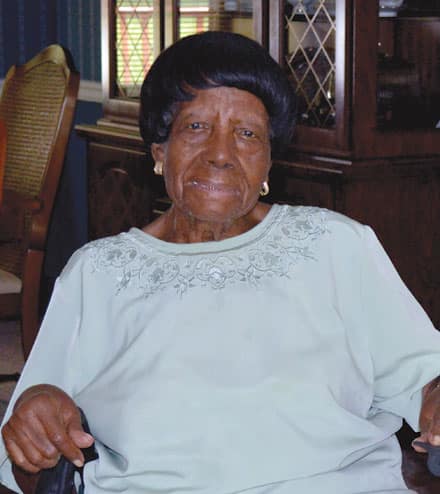
But doctors in her home state of Louisiana turned her down.
In search of options, the 97-year-old traveled from Louisiana to Georgia where her daughter, Mary Cornelious, lives. The two were originally planning to go to another area hospital. However, one night her symptoms brought her to the emergency room at Gwinnett Medical Center.
Louis Heller, MD, a cardiologist with Gwinnett Medical Group, took care of Atkins that night and determined that a transcatheter aortic valve replacement (TAVR) procedure would be the best option to restore her quality of life. TAVR, a recently FDA-approved procedure, has been in testing for years and is now the standard of care for elderly or other patients with aortic valve stenosis who are not good candidates for open-chest surgery.
“With this procedure,” said Dr. Heller, “regardless of age there’s an extensive pre-procedure evaluation. Once all the test results are in, I’m part of a team of physicians that meet to evaluate everything and make the decision to move forward. Almost all my TAVR patients are age 80 or older.” Until TAVR was perfected, the only option to repair a valve was open chest surgery, which is too invasive for many elderly people.
Dr. Heller determined that at 97, Atkins was in good health otherwise and that the procedure could enhance her ability to catch her breath and give her a more enjoyable life. “For many TAVR patients,” Dr. Heller added, “having this procedure may mean remaining independent instead of having to live in a skilled nursing facility.”
On July 1, Dr. Heller performed the procedure. TAVR is a minimally invasive surgical procedure that repairs the heart valve by wedging a replacement valve into the failing valve’s place. The valve is accessed either through entering through the femoral artery or via a small incision in the chest which allows access to another large artery.
“At Gwinnett Medical Center, we have patients up and about the day of the procedure,” added Dr. Heller. “Typically the patient stays two nights in the hospital and then goes home, back to their normal routine.”
After years of struggling to breathe, fatigue and sleeping propped up on pillows, Atkins found relief. In fact, she and her daughter noticed an immediate difference.
“It is so good now to walk by her room and see her not having such a hard time trying to breathe,” said Cornelious. “The difference is like night and day. I used to walk past her room and worry, but now all I see is my mother sleeping peacefully and comfortably.”
Atkins and both of her daughters said that recovery has gone smoothly, and were very happy with the entire experience. “The entire staff was so nice,” said Atkins. “It was the ideal place for me to be. I would recommend others suffering what I went through to go to GMC.”
How Gwinnett Medical Center Can Help
With state-of-the-art electrophysiology labs, open-heart surgery services, PCI, cardiac catheterization, TAVR and a range of other cardiac health services, the Strickland Heart Center has it all. Learn more at gmcheart.com, or call 678-312-5000 for a physician referral.

